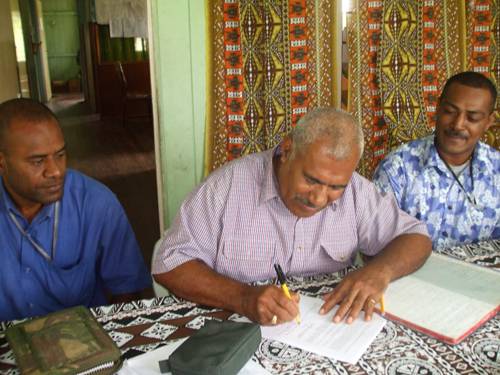Related News

The Cakaudrove Provincial Council has been given more than $80,000 to set up the Cakaudrove Integrated Resource Management Project. The council secured the grant through the UNDP Global Environment Facility Small Grant Program. The grant will be used to activate the newly-established body in the province, referred to as the Cakaudrove Yaubula Management Support Team (CYMST).
“This is a body endorsed by the provincial council and affiliated under the council office to provide service and offer help to local communities in carrying out a systematic way of conservation and management of resources,” said Semisi Meo, the project officer at the University of the South Pacific Institute of Applied Science.
“The emphasis is to promote and improve community participation and adaptive management at village level and generate information for policy makers. Hence, CYMST is a conduit of resource management issues from the grassroots level to the policy makers level,” he said.
The Cakaudrove integrated resource management project aims to facilitate 20 community resource management workshops in the 15 districts. The workshops will include information gathering from traditional and scientific knowledge to obtain a good overview of the area using participatory learning and action tools to analyse the situation. After this, a component of resource awareness and education is shared to leverage communities understanding of the complex ecological structure in the environment and priority needs in conservation and management.
Mr Meo said while Cakaudrove was blessed with great natural resources, the communities were continually defeated by the over harvesting of marine resources as it was a daily diet and an income source.
In an earlier workshop in the area, Mr Meo said there were stories of a decline in catch and longer hours out at sea. He said communities were still using traditional destructive fishing methods such as poison out of ignorance. He said some communities had access to modern fishing equipment and technology without knowing the implications and pressure that change in fishing technique placed on marine biodiversity.
These changes include the use of scuba gear for spear fishing and commercial invertebrate species gleaning, night diving gear, boats and navigational gear to enhance the area covered in a fishing trip. Mr Meo said pollution was another outcome of the rapid advance in development in the last couple of decades. He said there had been a steady increase of tourism development in way of hotels facilities and amenities with no proper treatment of sewerage, in particular Savusavu Town.
“Most communities do not have a proper waste management plan in place, which makes solid waste management and disposal an issue of high concern. Most coastal communities consistently clear off coastal tree species such as mangroves, leaving the coastline more vulnerable to shoreline erosion and inundation during adverse weather conditions and natural disasters,” said Meo.
“The province contributes significantly to the agricultural sector via semi-commercial farming and there is lack of compliance in best land use practices.
“There has been a continued trend in unnecessary burning and forest fires, which boils down to the demise of knowledge in linking land and marine issues.
“The underlying issue that encompasses all these issues is the lack of environmental awareness and education of the communities in Cakaudrove Province to understand and adapt their interaction with nature.”
The Fiji Locally Managed Marine Areas (FLMMA) Network has been very successful over the past years in helping local communities address these threats through the development of an adaptive management approach.
Unfortunately FLMMA is based on Viti Levu, with limited capacity in servicing outer islands. FLMMA has piloted strengthening of provincial administration to facilitate their roles and core functions on Kadavu. This has resulted in the establishment of a provincial entity called the Kadavu Yaubula Management Support Team.
The success of this pilot on Kadavu was what created interest in the Cakaudrove Provincial Council and the Commissioner Northern. The provincial office views resource management as significant and the set up of this provincial entity as essential.
“This project is multi-focal in which an integrated approach is adapted for the resource management in Cakaudrove. In the process of understanding and planning to address threats in this integrated resource management, this project will encompass disciplines of biological diversity and land degradation issues,” said Mr Meo.
“There is no proper administrative and facilitation of community resource management in Cakaudrove and at the provincial office.
“Villages and districts are independently recognising resource threats and issues but are not well addressed by the provincial office.
“Setting up CYMST will eventually foster better service of communities.”
He said the proposed solution was to conduct 20 resource management planning workshops through the newly established CYMST in the remaining 11 districts in the province.
Preliminary information on community interest would be assessed and passed by the Assistant Roko responsible for their respective areas of work. Workshops will include environmental awareness and identifying main threats and developing management plan to meet the issues mentioned.
The goal is for all the districts and or villages in Cakaudrove to develop a resource management action plan and subsequently have a marine protected area and/ or a forest reserve area.
An integration of traditional and modern fishing and land use practices will be promoted towards sustainability of resources and to overcome impacts of development.
A selection criterion for those participating from each village in the workshop will be set to empower gender and key people from each village for greater influence and impact in the implementation at the village level.
This initiative is to entrench capacity-building and empowerment of resource management.
Vasemaca Rarabici is a communications analyst with SeaWeb Communication Company, which helps the media to promote a healthy ocean.